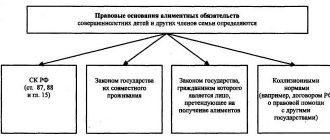The right to receive maintenance from biological parents or adoptive persons does not terminate under any circumstances except the death of such persons. It is clear that the deceased cannot fulfill his maintenance obligations (payment of alimony).
In all other cases, when the parent is not legally released from the obligation to support the child, the person in whose care he is, the state institution that is raising the minor, the guardianship authority, and in some cases the child himself, has the right to act as recipients of alimony.
The procedure itself is not complicated: replacing the alimony claimant has a number of features that you need to know about.
When is it necessary to change the claimant?
To submit an application to replace the alimony claimant, a number of the following cases must occur:
- reorganization of the organization in which the child was raised and which received alimony payments;
- in case of adoption of a child by another family;
- when guardianship is issued for a child and he moves to permanent residence with a new family;
- when one of the parents with whom the child lived died;
- when a child goes to live with a parent who pays child support.
The Civil Procedure Code of the Russian Federation states that the procedure for drawing up an application to change the alimony claimant is formal. This is not influenced by the grounds, and there is no unified form for drawing up the application itself.
Who can I change the alimony claimant to?
The alimony claimant who has died can be changed to the following persons or organizations:
- orphanage, guardianship and trusteeship authorities and other institutions where the minor child was placed under guardianship;
- a close relative, if a decree has been issued against them appointing them as guardians.
It is not possible to simply replace the claimant if he does not fall into the category of the above-mentioned people or organizations.
After the death of parents, in most cases the child's protection is handled by the guardianship authorities.
Can a child become a child support claimant?
After the child turns 18, he will be able to independently collect debts for unpaid child support.
If a child has disabled status and must receive alimony for life, he has the right to change the alimony claimant. Also, an incapacitated adult child may receive alimony to his personal account instead of his guardian or custodian.
The replacement of the alimony claimant also occurs in the case when the child is in the care of an educational institution. In such a situation, the money goes to his account. Until the child turns 18, he has no right to use the money in the bank account.
Collection procedure
If the debtor refuses to voluntarily pay alimony, then the bailiffs begin the collection procedure. They establish the debtor’s place of work, whether he has personal property, and determine the level of income. Representatives of the tax service, accounting staff of the employing enterprise, traffic police, BTI, credit organizations and other authorities may be involved in the work. All of them will help determine the debtor’s income level, his latest income and expenses.
Representatives of the FSSP have developed special methodological recommendations on the collection of alimony. Read more about this here:
Methodological recommendations on alimony from the FSSP of the Russian Federation
The first stage of collecting information about the debtor does not always bring very effective results. This is due to the workload of officials, as well as to the measures taken by the potential payer to conceal their income. Quite often, collectors are required to supervise FSSP employees and regularly write petitions: to seize the debtor’s property, to restrict the payer’s right to travel abroad, to create and charge a penalty, etc. In other words, officials do not always perform their duties effectively. Sometimes they need to be motivated and “driven.”
Expert opinion
Marina Bespalaya
In 2011 she graduated from the University of Internal Affairs with a degree in jurisprudence. In 2013, master's degree course, specialty "law". In 2010-2011, a course at Portland State University (USA) at the Faculty of Criminal Law and Criminology. Since 2011 - practicing lawyer.
When starting the procedure for replacing a bailiff, it is necessary to take into account the fact that there is a sequence of actions to bring an official to justice. Initially, a person is given the opportunity to improve and improve his work. If, after the manager’s two reprimands, nothing has changed, then the bailiff will be removed from the case, which is fraught with additional disciplinary measures.
Replacement of alimony claimant in enforcement proceedings
It is possible to replace the claimant in enforcement proceedings for alimony. In order to do this, you must contact the magistrates or district court.
There are situations in which the claimant is determined not in court and a writ of execution, but according to an agreement drawn up by the parents. With such a document, the person who made the decision to pay can change the creditor. To change the claimant by agreement, it is necessary to conclude a separate agreement with the new recipient of alimony.
If there is no writ of execution, then all encumbrances regarding the payment of alimony remain solely on the conscience of the alimony payer.
Replacement of a bailiff out of court
If the paying parent suddenly becomes responsible and decides to regularly pay child support, then the relationship with the bailiff can be severed altogether. It is only important that at the time of termination of the agreement the alimony holder does not have any debts.
FSSP employees can interfere with the payer, and sometimes even limit him in the implementation of his duties. Recently, a law was passed according to which driver's licenses can be confiscated from debtors. What should those citizens who earn money using their car do? Most likely, intimidated and limited in their rights, debtors will simply run away from their responsibilities. They can change their last name, find another job, move to a distant region, or become secret in any other way.
If a relatively good relationship has been established between two parents, there are guarantees and trust in each other, then it is really better to get rid of judicial interference and supervision by the FSSP. But what to do if the payer does not want to pay, and the official does not want to work with him? Are there any chances of getting financial assistance? You'll have to file a complaint again.
How does the alimony payer change?
From an alimony payer who does not fulfill his obligations to pay alimony, funds can be recovered through judicial proceedings.
It is worth considering that bailiffs also have the opportunity to apply to change the alimony payer, but they do not always express a desire to deal with such issues. Therefore, very often a new claimant needs to independently defend the rights of a minor child.
If the new claimant does not have the appropriate guardianship documents, the bailiffs may refuse to submit an application to change the claimant. It is also possible to obtain a waiver from them in the case where different guardians are assigned to different children, but alimony is collected in one proceeding. In such situations, the new claimant must go to court independently.
If the plaintiff is unable to produce the appropriate documents regarding custody of the child, the court will deny him or her the case. But, there are cases when a new alimony claimant manages to collect evidence that, taken together, can prove to the court that the child is in his custody.
In order to arrange a replacement of the claimant, it is necessary to act taking into account the following legal acts:
- Article 44 of the Civil Procedure Code of the Russian Federation, which describes the principle of procedural succession;
- Article 84 of the Family Code of the Russian Federation, which stipulates the right to submit an application with penalties for children who are left without parental care;
- Article 203 of the Civil Procedure Code of the Russian Federation, which states that a court decision cannot be changed.
Documents, cost
- A copy of the document for the defendant.
- Documents confirming the stated facts: death certificate of the parent raising the minor; documents on adoption, on registration of guardianship; data on the reorganization of the educational institution.
- Court decision on alimony. Due to the difficulty of obtaining a copy of the document through the court office, it is not necessary to provide it, since such a copy is available at the bailiff’s office.
There is no need to pay a state fee when submitting documents.
Procedure when going to court
To change the alimony claimant, you must go to court. The algorithm of actions will be as follows:
- it is necessary to receive a notification from the bailiff that it is necessary to change the claimant or, if he refuses, to go to court in person;
- collect all the necessary documents that need to be submitted to the court;
- make an application;
- go to court and receive a writ of execution upon consideration of the case materials (if the response from court employees is positive);
- transfer of the writ of execution to the FSSP with the application.
What documents need to be submitted?
To submit an application to replace the alimony claimant, you must collect the following documents:
- a copy of the applicant's passport;
- documents that confirm the existence of rights to custody of the child;
- information about enforcement proceedings received in court.
However, it is not necessary to submit a court decision on alimony along with these documents.
How to make an application?
To replace the alimony claimant, you must submit an application for replacement. The bailiff can submit an application on his own, if there is a petition from a new claimant, or give him a sample to fill out.
Since the application is submitted to protect the interests of a minor child, there is no need to pay a state fee for such an operation.
The document itself must contain the following information:
- address and name of the judicial authority to which the application is submitted;
- indicate the details of the applicant, the bailiff, and the recovering party;
- describe child support obligations;
- describe the circumstances that led to the need to change the claimant;
- documents that will confirm that the new claimant is the real guardian of the child and has the right to do so;
- the requirements expressed by the applicant;
- date of preparation of such a document;
- a list of papers that are attached to the application;
- applicant's signature.
The application must be drawn up in triplicate.
Rights of FSSP employees
Separately, we should talk about the powers of the FSSP representatives. In the field of alimony law, this is the protection of the rights and interests of minors, as well as supervision of the optimal life support of children. To achieve this goal, bailiffs enjoy a number of legal rights.
Firstly, this is a call to the FSSP department of the debtor, or his official employer. Such an event may be due to the collection of necessary documentation or some information. Sometimes a call to the FSSP is necessary to notify about the progress of enforcement proceedings.
Secondly, this is the collection of information about the debtor. Suppose a potential alimony payer decides to hide from providing financial assistance to his children. In this case, the bailiffs are obliged to find him. During searches, they have the right to use such rights as checking the debtor’s documents, establishing his place of work and residence, interviewing witnesses and close people, etc.
The third group of powers includes the implementation of requests to authorities in any way related to the payer. These are the traffic police, the Pension Fund, internal affairs bodies, the tax service, the place of work and even the embassies of foreign countries. The only problem is how often and well officials use such rights. Most often, work to find debtors ends before it even begins.
The next right is directly related to forcing the debtor to pay alimony. Bailiffs have a number of special enforcement measures that make it possible to quickly and effectively repay the debt. We are talking exclusively about legal measures: seizure of property, forced collection of a shared form of alimony from wages, sale of the debtor’s property at auction, etc. FSSP employees do not use rough and violent methods of influence. Unlike the same collectors, they are quite educated and legal-conscious.
Once sufficient evidence is collected, officials are able to submit it to the court. This is necessary for further progress of office work.
Application consideration period
An application submitted to replace the alimony claimant is considered by a bailiff within three days. After this, the claimant must receive enforcement proceedings, which will indicate a resolution to replace the claimant.
At a court hearing, such an application will be considered within 30 days.
The review period may be delayed if other unforeseen situations arise. For example, the alimony payer does not indicate his real income or evades paying alimony. To resolve such issues, employees of the internal affairs bodies will be involved.
How to make bailiffs work?
The best way to put pressure on unscrupulous FSSP employees is to write a complaint against them to the prosecutor's office. It is necessary to collect evidence of employees ignoring their professional duties. It could be:
- untimely initiation of enforcement proceedings;
- failure to send a resolution to the parties to initiate proceedings;
- failure to take procedural measures to collect debt;
- lack of up-to-date information about the production process in a single electronic database.
Witness testimony will serve as evidence - for example, postal workers who did not observe the order when delivering letters. If there was a rude attitude towards any of the parties, then the incident can be filmed and presented to the court. It is only important to understand that inaction is always harder to prove than unlawful action. But with due diligence, you can put pressure on FSSP employees and put paperwork on the right track.










